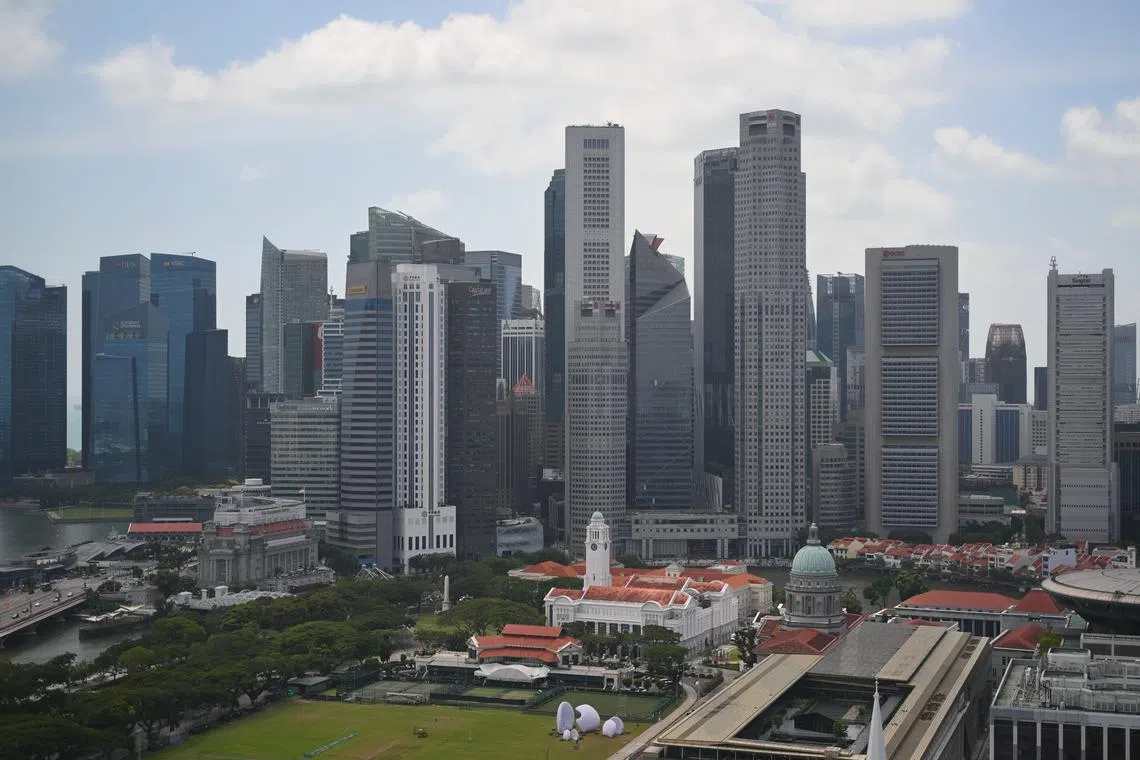Schemes to liven up city centre, redevelop core areas extended for 5 years: Desmond Lee
Sign up now: Get ST's newsletters delivered to your inbox

The CBDI scheme aims to encourage the conversion of older and predominantly office developments in the CBD into mixed-use buildings.
ST PHOTO: KUA CHEE SIONG
SINGAPORE – Two urban rejuvenation schemes that aim to liven up the city centre by bringing more apartments into core areas and redeveloping existing commercial buildings will be extended for five years, Minister for National Development Desmond Lee said.
But the two initiatives – the Central Business District Incentive (CBDI) and Strategic Development Incentive (SDI) schemes – which give developers incentives to undertake these projects, will be fine-tuned further, said Mr Lee on Feb 7.
Speaking to more than 500 attendees at the Real Estate Developers’ Association of Singapore’s (Redas) Spring Festival luncheon, he added that the authorities have completed a review of both initiatives after they hit their five-year mark in November 2024.
The CBDI scheme aims to encourage the conversion of older and predominantly office developments in the CBD into mixed-use buildings. It offers developers an increase in the maximum allowable gross floor area in exchange for a change in land use from offices to homes or hotels.
The SDI scheme encourages owners of existing commercial buildings to come up with a joint redevelopment proposal with their neighbours that would transform the street or precinct.
Both schemes have been well received so far and would be fine-tuned in two ways, Mr Lee said.
First, he said developments in the Anson and Cecil areas would be given more flexibility to retain existing commercial uses under the CBDI, as long as they provide long-stay serviced apartments.
Long-stay serviced apartments come with a three-month minimum stay period, as opposed to other serviced apartments where the minimum rental period is seven days.
Before the change, such flexibility was given only to office developments in the Tanjong Pagar, Robinson Road and Shenton Way areas. These developments were allowed to retain their existing commercial use under the CBDI scheme, so long as they convert a significant portion of their office space to non-commercial uses.
Mr Lee said this change, which will “introduce more options for people who want to live near their workplaces and amenities in the city centre”, came after the authorities received feedback from industry engagements that this could improve the attractiveness of the CBDI.
The Feb 7 event marked the minister’s first time attending the Redas Spring Festival lunch in over five years.
Also speaking at the event, Redas president Tan Swee Yiow said: “With elections rumoured to be just around the corner, we look forward to hosting you, perhaps in a new capacity, at future Redas events.”
The second change to both schemes will require redevelopment proposals to meet new sustainability requirements.
Applications under both schemes will have to include a sustainability statement that assesses the feasibility of retrofitting part or all of the existing building, said Mr Lee.
An additional carbon optioneering assessment, weighing the trade-offs of different redevelopment options on the carbon emissions they produce, may also be required for planning approval.
“This means that in order to qualify for the incentives, our developers and building owners will now need to consider ways to reduce the environmental impact of redevelopment,” Mr Lee said.
“We know that meeting our net-zero target goals for Singapore and the whole world means that every sector must play its part, and the key is to strike a balance; and in our sector, between a brand-new redevelopment and retrofitting and enhancement,” he said.

National Development Minister Desmond Lee (left) with Redas president Tan Swee Yiow enjoying the lion dance performance at the Redas Spring Festival luncheon on Feb 7.
ST PHOTO: CHONG JUN LIANG
He added that the authorities support efforts to revitalise and rejuvenate the city centre through redevelopment, but they do not want “wasteful demolition and excessive rebuilding, especially if the buildings are relatively young or still in good shape”.
Doing so wastes resources and generates significant carbon emissions, Mr Lee said, adding that the Urban Redevelopment Authority will be issuing an industry circular with more details.
He also said most of the 17 CBDI and 12 SDI proposals have been granted in-principle approval.
Four CBDI projects in the Anson-Tanjong Pagar neighbourhood – Newport Plaza, The Skywaters, 15 Hoe Chiang Road and 51 Anson Road – are undergoing construction.
When these projects are completed, the area will have more than 1,000 new homes, hotels, shops and eateries, as well as new public spaces, Mr Lee said.
Mr Edwin Loo, an associate director at real estate consultancy Cistri, said allowing long-stay serviced apartments in CBDI scheme proposals was a positive move.
Before this change, the main option was to develop residential units for sale, but the stringent additional buyer’s stamp duty of 60 per cent for foreign buyers has crimped demand for such properties.
Mr Loo said long-stay serviced apartments would help to fill market demand from expatriates and globally mobile Singaporeans seeking a short- to medium-term rental housing solution with good access to work, dining and lifestyle options in the CBD.



